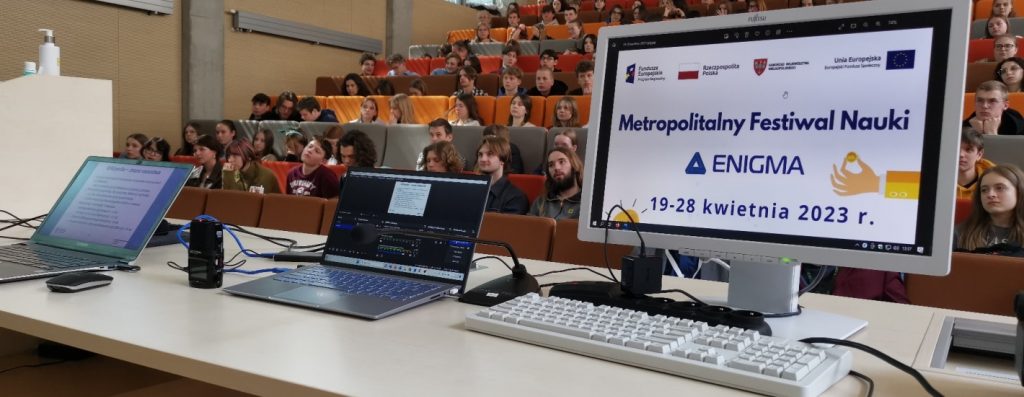
Members of the Department of Information Systems conducted lectures and workshops during the five editions of the ENIGMA Metropolitan Science Festival. Over 1,000 students from various schools in Poznań and Szamotuły took part in the events. The materials presented during the Festival included issues related to the scientific research of our Department in the field of automatic identification of fake news on the Internet, assessment of the quality of information in Wikipedia using artificial intelligence algorithms and blockchain technology.
Identifying real and fake information on the Internet using artificial intelligence and big data
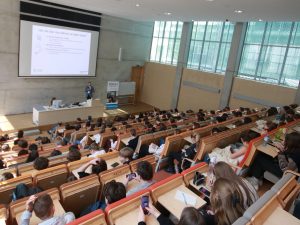 Issues related to the use of artificial intelligence and big data to identify fake news were presented by Dr. Włodzimierz Lewoniewski and Dr. Milena Stróżyna. During the workshop, students had the opportunity to test their skills in this area. In addition, there was a discussion on this topic, highlighting how important it is for our society to understand and fight disinformation.
Issues related to the use of artificial intelligence and big data to identify fake news were presented by Dr. Włodzimierz Lewoniewski and Dr. Milena Stróżyna. During the workshop, students had the opportunity to test their skills in this area. In addition, there was a discussion on this topic, highlighting how important it is for our society to understand and fight disinformation.
Identifying fake information, also known as “fake news”, is one of the main challenges of the modern digital world. With the help of artificial intelligence and large data sets (Big Data), it is possible to identify such information in a much more effective way. Artificial intelligence-based algorithms are able to analyze texts in many different ways. For example, it may look for known indicators of false information, such as extreme emotions, excessive use of capital letters, or untrue claims. It can also check whether a source of information is credible or whether it is often cited as a source of false information.
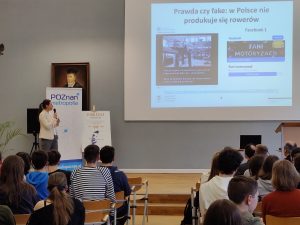 Artificial intelligence-based algorithms are able to learn from big data sets what true and false information looks like. This may include analyzing text structure, writing style, or words used. Using machine learning algorithms such as neural networks, you can learn to recognize false information automatically with varying degrees of accuracy. In addition, using algorithms based on artificial intelligence, it is possible to analyze how information spreads in the network. Fake news often spreads in specific ways, for example, it goes viral quickly but is shared by accounts that have few followers or that have recently been created. Artificial intelligence can use this information to identify potentially false information.
Artificial intelligence-based algorithms are able to learn from big data sets what true and false information looks like. This may include analyzing text structure, writing style, or words used. Using machine learning algorithms such as neural networks, you can learn to recognize false information automatically with varying degrees of accuracy. In addition, using algorithms based on artificial intelligence, it is possible to analyze how information spreads in the network. Fake news often spreads in specific ways, for example, it goes viral quickly but is shared by accounts that have few followers or that have recently been created. Artificial intelligence can use this information to identify potentially false information.
Modern technology allows you to automatically check the facts presented in the information. This may include checking dates, places, people or events against external databases and comparing them with the information presented. This is where semantic analysis of texts can be particularly useful – artificial intelligence is able to understand the context and meaning of the text, which allows the identification of false information that may not be obvious at first glance.
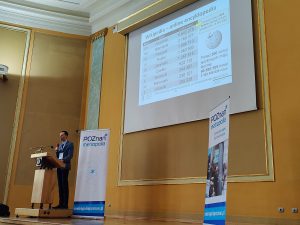 As part of the presentation, the research of our Department in the field of automatic evaluation of information quality in one of the most popular Internet sources of information – Wikipedia – was presented. Based on the analysis of over 60 million Wikipedia articles in over 300 different languages, the process of identifying potentially false information can be automated in some way. In addition, you can analyze the importance of information sources that are placed in hundreds of millions of references in Wikipedia articles.
As part of the presentation, the research of our Department in the field of automatic evaluation of information quality in one of the most popular Internet sources of information – Wikipedia – was presented. Based on the analysis of over 60 million Wikipedia articles in over 300 different languages, the process of identifying potentially false information can be automated in some way. In addition, you can analyze the importance of information sources that are placed in hundreds of millions of references in Wikipedia articles.
The principle of free editing of this encyclopedia is to allow any Internet user to add, edit and delete content. This has some advantages and disadvantages. Wikipedia may contain false information, misinformation or even vandalism, which may affect the credibility and quality of content. Maintaining high-quality articles is a challenge, especially given the scale and variety of topics. This requires an active community of moderators and editors who uphold Wikipedia’s policies and ensure content quality. In addition, information in each language version can be edited independently.
Our department is currently implementing the OpenFact project, which is carried out in cooperation with technological and substantive partners, including: Google, Facebook, Bright Data, Harvard University, as well as leading fact-checking organizations in Poland. During the evaluation of the first phase of the INFOSTRATEG program of the National Center for Research and Development, in the field of fake news detection using artificial intelligence, the OpenFact project received the highest number of points.
Blockchain technologies
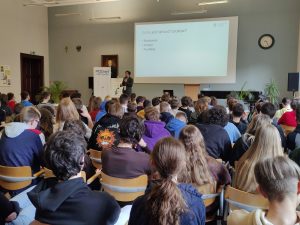 Issues related to blockchain technology and the potential of this technology to transform our society and economy were presented by Dr. Piotr Stolarski. This technology is primarily known as the basis for cryptocurrencies (such as Bitcoin) and has the potential to transform many sectors of the economy and society.
Issues related to blockchain technology and the potential of this technology to transform our society and economy were presented by Dr. Piotr Stolarski. This technology is primarily known as the basis for cryptocurrencies (such as Bitcoin) and has the potential to transform many sectors of the economy and society.
Blockchain technology is often called the technology of the future. One of the reasons is security and reliability – blockchain is extremely secure thanks to its structure, which does not allow modification of already registered data. Each block of information is cryptographically secured and connected to the previous block, creating a reliable data network. An additional advantage of blockchain technology is the decentralization of stored data – there is no need to rely on a central authority, such as a bank or government, to conduct transactions or manage data. This translates into greater transparency and resistance to manipulation. In addition, blockchain-based transactions are processed quickly, regardless of the parties’ location, eliminating the need for middlemen and the associated delays and costs.
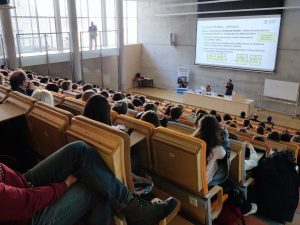 In general, blockchain technologies have a wide range of applications: blockchain has the potential to transform various sectors, ranging from finance, supply chains, health, energy, real estate, to the public sector and education. It can be used to secure transactions, manage digital assets, store medical records, trace the origin of products, and much more. As part of the discussion of blockchain technology, it is also worth mentioning the concept of Smart Contracts – these are self-executing contracts that automatically perform transactions or other activities when certain conditions are met. Thanks to this, the processes are much more efficient and safe. In other words, blockchain technology stimulates cooperation between various entities – both individuals and institutions – by creating ecosystems based on trust and transparency.
In general, blockchain technologies have a wide range of applications: blockchain has the potential to transform various sectors, ranging from finance, supply chains, health, energy, real estate, to the public sector and education. It can be used to secure transactions, manage digital assets, store medical records, trace the origin of products, and much more. As part of the discussion of blockchain technology, it is also worth mentioning the concept of Smart Contracts – these are self-executing contracts that automatically perform transactions or other activities when certain conditions are met. Thanks to this, the processes are much more efficient and safe. In other words, blockchain technology stimulates cooperation between various entities – both individuals and institutions – by creating ecosystems based on trust and transparency.
ENIGMA Metropolitan Science Festival
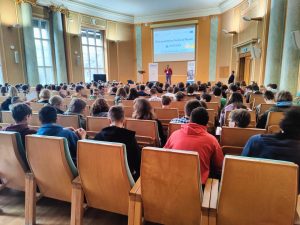 The aim of the ENIGMA Metropolitan Science Festival is to increase the effectiveness of education through activities aimed at improving the competences of students from various schools. On April 19-28, five editions of this event took place. The organizer of the Festival is the Poznań Metropolitan Association. The strategic partner is the Poznań University of Economics and Business, whose lecturers shared their knowledge and experience with young people.
The aim of the ENIGMA Metropolitan Science Festival is to increase the effectiveness of education through activities aimed at improving the competences of students from various schools. On April 19-28, five editions of this event took place. The organizer of the Festival is the Poznań Metropolitan Association. The strategic partner is the Poznań University of Economics and Business, whose lecturers shared their knowledge and experience with young people.
Schools that took part in the Festival:
- St. John Cantius High School in Poznań
- Dąbrówka High School in Poznań
- Adam Mickiewicz High School in Poznań
- Saint Mary Magdalene High School in Poznań
- Piotr Skarga High School in Szamotuły
- School Complex No. 2 in Szamotuły
- Primary School No. 1 in Szamotuły
- Primary School No. 3 in Szamotuły
More information about the ENIGMA project can be found at: enigma.metropoliapoznan.pl